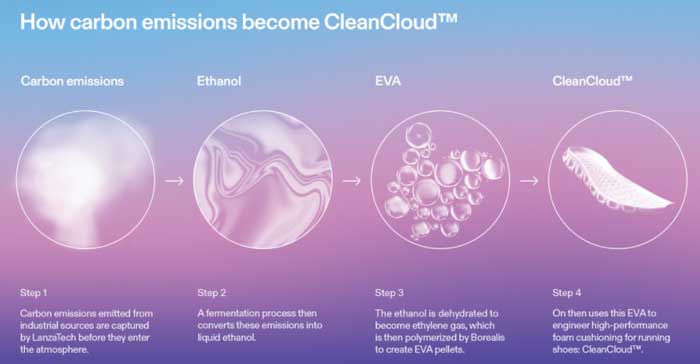Footwear goes green
The footwear sector is seeing a number of sustainable tie-ups between materials and footwear manufacturers.
Getting on with CO2-emissions foam for footwear

Swiss sports brand On is moving away from petroleum-based resources by creating a new foam material called CleanCloud, made using carbon emissions as a raw material. On is the first company in the footwear industry to explore carbon emissions as a primary raw material for a shoe bottom unit, specifically EVA (ethylene vinyl acetate) foam, which could also be used in other shoe parts and products in the future.
On says it is convinced that innovation is pivotal to cutting greenhouse gas emissions.
CleanCloud is the result of four years of work and a partnership with LanzaTech and Borealis. LanzaTech is using a combination of genetic engineering, artificial intelligence, and innovations in mechanical and chemical engineering to manufacture chemicals using a process that soaks up carbon rather than emitting it.
Meanwhile, chemical firm Borealis also has circular and renewable plastic solutions to create easy-to-process EVA foam for CleanCloud.
This is how it works: Technology from LanzaTech captures carbon monoxide emitted from industrial sources like steel mills or emissions from landfill sites before being released into the atmosphere. Once captured, these emissions enter a patented fermentation process.
Thanks to specially selected bacteria, the carbon-rich gas ferments naturally and is converted to liquid ethanol by the bacteria. This natural fermentation process is similar to that of conventional alcohol production – e.g., beer brewing.
The ethanol is then dehydrated to create ethylene, which is then polymerised by Borealis to become EVA (a copolymer of ethylene vinyl acetate) – the lightweight material that On starts working with to create a performance foam for shoes.
The overall goal is to exchange all bottom units from On shoes currently made from EVA with CleanCloud. This includes the whole Cloud range, THE ROGER franchise collection and a part of the active lifestyle assortment.
Outdoor sports shoe from biobased/recycled materials
German materials supplier Covestro and VAUDE, a family-owned manufacturer of outdoor equipment and footwear, have collaborated to develop a partially biobased foam midsole for VAUDE’s new Lavik Eco outdoor hiking boot. It is based on thermoplastic polyurethane (TPU) foams from Covestro’s Desmopan EC 33000 series, which use non-GMO raw materials. The durable foams are said to meet the outdoor brand’s Green Shape criteria without sacrificing performance.

"With the new Lavik Eco, we want to introduce our first biobased outdoor shoe in the 2022 summer collection and the first outdoor sports shoe ever in which all components are made from more than 50% biobased and recycled materials," explains Clément Affholder, Innovation Manager at VAUDE.
The Lavik Eco shoe is scheduled to be available in stores as a men's and women's model from spring 2022.
The midsole is a crucial element in a hiking boot: it must be pleasantly soft and comfortable, but also provide a firm grip and have excellent cushioning properties.
"TPU has already proven itself as a durable and supportive material in midsoles for active footwear such as mountain boots. However, in this soft and hard material combination, it has not been produced with non-GMO raw materials before," says Sayma Hou, Key Account Manager Footwear at Covestro.
Together with VAUDE, Covestro has identified and tested start-up raw material supplier Metabolic Explorer, which can supply bio-based 1,3-propanediol, a building block in the production of polymers from palm oil. The fact that the chemical raw material is not genetically modified also played a role in the evaluation.
The Desmopan EC series for the midsole and beyond is characterised by high abrasion resistance and flexibility over a wide temperature range, as well as high elasticity in various degrees of hardness. The series offers waterproof qualities as well as oil, grease, and solvent resistance and stands up well to weathering and high-energy radiation. Compared to fossil-based TPUs, the EC series can reduce the carbon footprint by more than 20% without compromising on quality or performance.
The outdoor manufacturer has already been using partially biobased TPUs from the Desmopan EC series for its TRK Skarvan hiking boots since 2018. In these more sustainable shoes, the bioplastic provides protection in the toe cap against injury from stones in the front of the foot and added stability from the heel cap in the back.
Green Shape is the VAUDE label for functional and environmentally friendly products made from more sustainable materials. The manufacturer is focusing on more environmentally friendly alternatives to petroleum-based raw materials, the increased use of recycled materials and materials derived from natural fibers such as hemp and organic cotton, and the use of biobased plastics from non- GMO sources.
(PRA)
Subscribe to Get the Latest Updates from PRA Please click here
©2021 Plastics and Rubber Asia. All rights reserved.

©2020 Plastics and Rubber Asia. All rights reserved.
Home Terms & Conditions Privacy Policy Webmail Site Map About Us


















